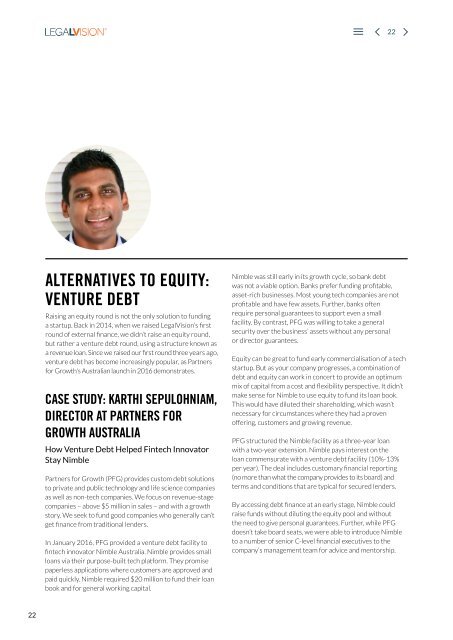Create successful ePaper yourself
Turn your PDF publications into a flip-book with our unique Google optimized e-Paper software.
22<br />
ALTERNATIVES TO EQUITY:<br />
VENTURE DEBT<br />
Raising an equity round is not the only solution to funding<br />
a startup. Back in 2014, when we raised LegalVision’s first<br />
round of external finance, we didn’t raise an equity round,<br />
but rather a venture debt round, using a structure known as<br />
a revenue loan. Since we raised our first round three years ago,<br />
venture debt has become increasingly popular, as Partners<br />
for Growth's Australian launch in 2016 demonstrates.<br />
CASE STUDY: KARTHI SEPULOHNIAM,<br />
DIRECTOR AT PARTNERS FOR<br />
GROWTH AUSTRALIA<br />
How Venture Debt Helped Fintech Innovator<br />
Stay Nimble<br />
Partners for Growth (PFG) provides custom debt solutions<br />
to private and public technology and life science companies<br />
as well as non-tech companies. We focus on revenue-stage<br />
companies – above $5 million in sales – and with a growth<br />
story. We seek to fund good companies who generally can’t<br />
get finance from traditional lenders.<br />
In January 2016, PFG provided a venture debt facility to<br />
fintech innovator Nimble Australia. Nimble provides small<br />
loans via their purpose-built tech platform. They promise<br />
paperless applications where customers are approved and<br />
paid quickly. Nimble required $20 million to fund their loan<br />
book and for general working capital.<br />
Nimble was still early in its growth cycle, so bank debt<br />
was not a viable option. Banks prefer funding profitable,<br />
asset-rich businesses. Most young tech companies are not<br />
profitable and have few assets. Further, banks often<br />
require personal guarantees to support even a small<br />
facility. By contrast, PFG was willing to take a general<br />
security over the business’ assets without any personal<br />
or director guarantees.<br />
Equity can be great to fund early commercialisation of a tech<br />
startup. But as your company progresses, a combination of<br />
debt and equity can work in concert to provide an optimum<br />
mix of capital from a cost and flexibility perspective. It didn’t<br />
make sense for Nimble to use equity to fund its loan book.<br />
This would have diluted their shareholding, which wasn’t<br />
necessary for circumstances where they had a proven<br />
offering, customers and growing revenue.<br />
PFG structured the Nimble facility as a three-year loan<br />
with a two-year extension. Nimble pays interest on the<br />
loan commensurate with a venture debt facility (10%-13%<br />
per year). The deal includes customary financial reporting<br />
(no more than what the company provides to its board) and<br />
terms and conditions that are typical for secured lenders.<br />
By accessing debt finance at an early stage, Nimble could<br />
raise funds without diluting the equity pool and without<br />
the need to give personal guarantees. Further, while PFG<br />
doesn’t take board seats, we were able to introduce Nimble<br />
to a number of senior C-level financial executives to the<br />
company’s management team for advice and mentorship.<br />
22















